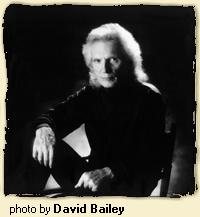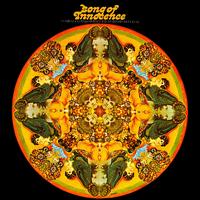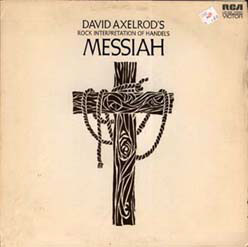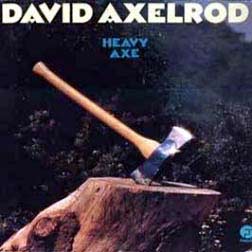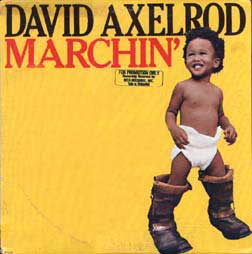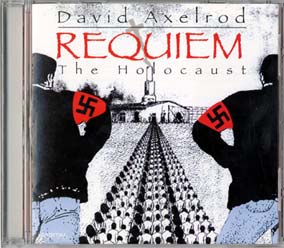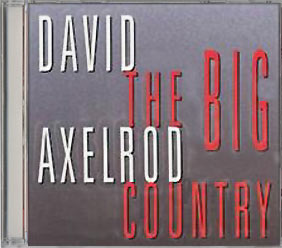The stuff my nerdy dreams are made of. The story of how this album came to be is nothing short of remarkable. After Axe received a career revival of sorts in the late 90's from everybody sampling his stuff, somebody whom he had worked with at Capitol sent him some unfinished recordings on acetate and a close friend, upon hearing them, convinced Axe to finish the songs and record a "new" album. The acetate tracks consisted of Axe's now classic rhythm section he employed religiously in his Capitol days: Earl Palmer on drums, Carol Kaye on electric bass, and the now deceased Howard Roberts on electric guitar. Of the nine tracks on the album, seven were old tracks taken from the acetate and two were brand new. The two new tracks were the only ones to feature vocals. One, titled "The Little Children," featured west coast rapper Ras Kass spitting his prophetic fire over a purposely chaotic string arrangement. The other, titled "Loved Boy," featured an emotionally stirring appearance from Axe's old collaborator Lou Rawls on a dedication to Axe's deceased son. Both songs sound much like Axe's post-
work. As for the "new old songs", they sound much like you hoped they would. Very reminiscent of the glory days at Captiol. Although that much of something so good can be overwhelming for an overly analytical dork such as myself, "The Shadow Knows" strikes me as one of Axe's finest moments in his entire career. Overall, the album is a huge success and easily one of Axe's top five (or maybe even top three) albums of his entire career. Also of note is the cool ass liner notes written by DJ Shadow and on the CD version of the album, there's an excellent enhaced CD portion complete with a 10 minute mini-movie about the making of the album. Released on James Lavelle's Mo' Wax label, it's still in print for now and very highly recommended.
 Live at Royal Festival Hall (David Axelrod Music, 2006)
Live at Royal Festival Hall (David Axelrod Music, 2006)
Recorded in 2001 in the aftermath of the European success of his Mo' Wax album, but not released until five years later. If that album was the stuff my nerdy dreams were made of, this album is the stuff my worryingly obsessive dreams are made of. I mean, in all honest seriousness, I have a hard time making it through this album without getting choked up and having tears dripping down my cheeks. Laugh at me all you want, but damn, is this redemption or what? Recorded at London's Royal Festival Hall with a full orchestra and a sold out crowd, it's just a testament to the amazing timelessness and overall quality of this music that the majority of it could be conceived in the late 60's, be revived over thirty years later, those new recordings sit in the oven for five years, and it
still sounds as fresh as ever. The setlist here focuses on Axe's Capitol period, which is, simultaneously, a literal dream come true (for me) and somewhat disappointing. Here's both sides: 1) the dream come true: Imagine me as a wide-eyed eighteen year old recent high school graduate working a job as a shipping clerk in a DJ sound equipment store, swearing off weed and booze, yet trying to be in a turntablist group and growing more and more fascinated with breaks and jazz. I opened boxes containing Technics 1200's while blaring
Earth Rot and Axe production mixtapes on the boombox in the receiving room. So, yeah. Live hip hop was disappointing at the time, to say the least. So, all I could do was sit back and imagine how amazing it would be to see something like "
The Smile" or "
Holy Are You" live. So, to actually have an actual document of (what I think are) the only live performances of those songs is absolutely incredible. Life changing. 2) the disappointment: There is nothing here past 1969. Can you imagine how great stuff like "
Terri's Tune" or the
Messiah overture would've sounded here? Granted, I generally agree that the period documented here is Axe's most consistent, but man, what a missed opportunity. But, there is an upside: the three unheard songs. Well, ok, only one of them is actually new. However, the two covers (The Stones' "
Paint it Black" and the Beatles' "
Norwegian Wood", retitled here "
Spanish Wood") are so different from their original arrangements, they are, more or less, new songs. Slightly discernible melodies pop up here and there, but they are so distorted, you probably wouldn't have known they were covers if the tracklist didn't indicate it. The third song, a little vamp titled "
So Low", is a revelation. It's
Requiem meets
Songs of Experience and it's stunning. The performance is flawless. Littered with numerous open drum breaks and unexpected chord shifts, it could easily be mistaken for an actual outtake from the Capitol days. And the thing that really stands out here, and the thing that puts these songs into an entirely new context, is the bass player. On all those old Capitol recordings, it's Carol Kaye on electric bass. However, in this live setting, it's professional Brit musician Ali Friend on
acoustic bass. Gives all these otherwise familiar tunes a serious revamp. I mean, c'mon, those open breaks on "
Holy Thursday" and "
Urizen just sound even juicier now, don't they? The addition of the Verve's lead singer Richard Ashcroft on "
Holy Are You" is another revelation in itself; a revision through a pompous British dude was all it needed, perhaps? "
The Human Abstract" pops up, and that's where the tears start swelling. If the self titled record was great initially, but perhaps a little bit of a letdown in the long run, consider this one of —if not the single— best albums released in my lifetime. Packaged in a DVD/CD combo (the CD excludes "
London" on account of length issues), it's simply a devastating shame it's not more widely available.
Axelrod Compiled...
Since the re-emergence of the Axe man in the late 90's, a lot of compiling has been done. Although I recommend skipping these kinds of albums altogether, especially with an artist as diverse as Axelrod. If you are just curious about him, I suppose starting with one of these albums would be wise.

Fantasy issued The Axelrod Chronicles in 2000 and it compiles the entirety of the Heavy Axe full length with a few selected cuts from albums Axe worked on while at Fantasy. It's hard to understand the selections because they are often not representative of the albums they came from, not to mention that they are far from being album highlights (save for Nat Adderley's "Quit It" and the two Gene Ammons tracks). It is however, the only place you can get anything other than the Mo'Wax record domestically and it's remastered and affordably priced.
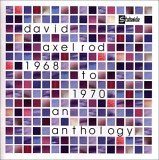
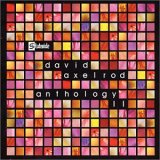
EMI UK's two anthologies are filled with great selections from the Capitol days (except for a few newer tracks on volume two). Volume one features more Axelrod solo stuff, where volume two has more production rarities. The first volume was my first taste of his work and it served me well, but ultimately wasn't anything more than an appetizer while I tracked down the proper albums. Now that EMI UK has also issued the Capitol albums in their entirety, these seem a little redundant unless you absolutely can't find the productions and collaborative works anywhere else.

Domestically, it took Capitol over five years to realize what they were sitting on and they finally issued The Edge in 2005, which is basically a one disc synopsis of the two UK anthologies. It leaves out a few things, but if you just want one cost effective disc that covers most of the essentials, this would probably be the way to go. The remastering job was handled by Blue Note's in-house audiophile Michael Cuscuna so the remastering is great.
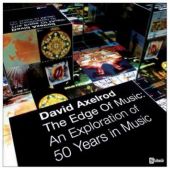
EMI UK took the first step in reissuing Axe's entire catalogue with the two disc The Edge of Music in 2006. It's the only place to find official CD issues of tracks from his post-Capitol, non-Fantasy work, but at the same time, it feels rather redundant, rehashing the same tracks from the Capitol days yet again and only offering one or two tracks a piece from later albums.
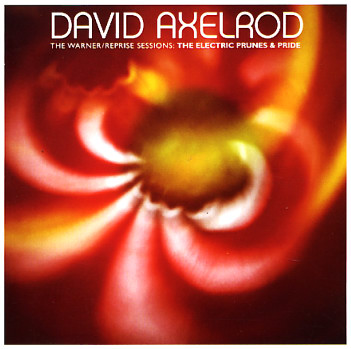
EMI UK took another huge step in 2007 when they issued The Warner/Reprise Sessions. A two disc anthology spotlighting one very well-known period and one very much forgotten period in Axe's career. The well-known stuff is the two Electric Prunes albums that Axe worked on: Mass in F Minor (1967) and Release of an Oath (1968). Mass in F Minor is much more garage-y, much more vintage Prunes. Which makes sense, because the Prunes actually played on it. Release of an Oath, on the other hand, is a completely different story. Most of the band quit during the recording of the album, so Axe hired on his Capitol studio musicians to finish the record (the liner notes do a good job of going into detail about this). And it really shows. It's now pretty much considered Axe's first proper album by hardcore fans and it's absolutely essential listening to fully understand Axe's early music. The really great thing about this collection is that it fully reissues and remasters the album that Axe recorded in 1970, under the guise of Pride. Nooney Ricketts (of Love) sings the vocals (which were written by Axe's son) and the album takes on a strange Latin/folk/rock hybrid sound. There are no strings to be found and the only electric instrument is the bass. A strange album that has unfortunately eluded many fans for years because of the exceeding rarity of the original. It benefits greatly from the remastering job and is just great to have readily available. It's personally one of my favorite things from the Axelrod discography. Disc two of the collection presents both of the Electric Prunes albums in fully instrumental form, and in the case of two-thirds of Release of an Oath, it repeats the instrumental songs again with the drums chunked up and the strings mixed out. Overall, this is an extremely valuable addition to any Axe fan's collection. Well done.
Go home.
